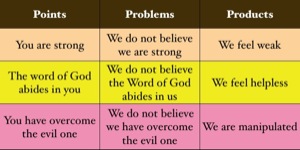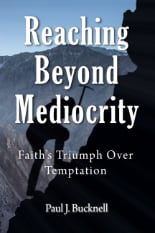

Discovering Choices: Lesson #2
Discipleship Level 2: Reaching Beyond Mediocrity
Paul J. Bucknell
Choices | Battlefield | Evaluation | Path of Life | 3 Choices
Purpose: Victory on the Battlefield, the second part of the second lesson Discipleship 2: Reaching Beyond Mediocrity series, helps us see the faith that we need to have and the importance this faith has upon our spiritual growth.
Victory on the Battlefield
We will only rely on God's truth if we believe there is positive hope for change through it. God wants each of us to succeed. This increasing sense of confidence arises from a previous victory.
1 John 2:14 The Victory
1 John 2:14 summarizes for us our major focus of 'young men' in the Level 2 discipleship series. Note what has made these young men strong.
"I have written to you, young men, because you are strong, and the word of God abides in you, and you have overcome the evil one" (1 John 2:14).
- The point is that we are strong.
- The problem is that we do not believe we are strong. We feel weak.
- The point is that the word of God abides in us.
- The problem is that we do not know how to use the word of God to help us overcome the battle. We feel helpless.
- The point is that we have overcome the evil one.
- The problem is that we have felt overcome by the evil one and allow ourselves be manipulated by him. We end up following our feelings a majority of the time.
What does it mean that they have overcome the evil one? First we should notice that this is written in the past tense. It has been accomplished, but it has lasting effects on the believers' lives. This refers to the victory that Jesus had through His death and resurrection and how He has overcome the evil one. The believer does not need to be thrust back and forth by the evil one anymore. We often are but we do not need to just as Jesus refused to be moved by Satan's temptations either at the beginning or end of His earthly life.
"Since then the children share in flesh and blood, He Himself likewise also partook of the same, that through death He might render powerless him who had the power of death, that is, the devil" (Hebrews 2:14).
The lack or presence of hope and faith are displayed through our attitudes and choices. We might want something good, like being kind to our husbands. But we are despondent about the whole matter. After all, we have tried before. When we give up hope for change, we in fact have resolved in our minds that God cannot help us in that particular situation.
 So we feel weak, helpless and just live by the motto 'I can't help it.' We bolster our thoughts with meager excuses and catch phrases of the day.
So we feel weak, helpless and just live by the motto 'I can't help it.' We bolster our thoughts with meager excuses and catch phrases of the day.
"Everyone is doing it.' 'I guess I can't change.' We go on and distract ourselves with other matters and addictions so that we do not need to think about it. This deepens our sense of hopelessness and further removes us from our solution of hope found in God's Word. Down deep we feel guilty because we are guilty. And even if we hear the Word of God, one by one the truths which could have helped us are quickly snatched away as in the parable of the sower.
The Battlefield
The mind is the battlefield. The battlefield is where opposing forces meet and convincingly struggle to gain control of each other. The scenes are ugly. One lurches forward and attacks the other. They both fight until one loses. Upon our loss, we hang our heads in shame as we sneak away hoping no one noticed. Meanwhile the evil one is filling our minds with all sorts of jests, making us feel like we will never be able to win the battle.  (Of course, the opposite is true. When we win, we are joyful and share with others through the testimonies of what God has done.)
(Of course, the opposite is true. When we win, we are joyful and share with others through the testimonies of what God has done.)
The battle is in our minds over what we believe. What we believe in shapes our hopes. Hope creates faith while fear of loss, pain, guilt, defeat, etc. destroys faith. John, however, states that the young man is strong. That 'young man' refers to those who are at the discipleship level 2. Are you strong? What makes you feel weak?  Why do you for the most part excuse yourself from such a claim of victory and willing to live as if you have lost? Can you see how your hope has leaked from your spirit? If hope has dissipated, faith has departed.
Why do you for the most part excuse yourself from such a claim of victory and willing to live as if you have lost? Can you see how your hope has leaked from your spirit? If hope has dissipated, faith has departed.
With the number of broken dreams, destroyed marriages, family feuds and problems at work, one can visibly see how the brightness of people's countenance is gone from the souls of people. The world might be with 'no hope.'
"Remember that you were at that time separate from Christ, excluded from the commonwealth of Israel, and strangers to the covenants of promise, having no hope and without God in the world" (Ephesians 2:12).
This hopelessness, however, certainly should not be the mark of the people of God. It is anti-gospel. The enemy is relentless in bringing us down. If he can jump on us and get us down, then he tries to keep us down through hopelessness. Hopelessness makes one willing to endure the shame, pain and loss rather than trying to get out of it.
-> Continue on reading part 3/6: Evaluation our Spiritual Growth
Directory of Discipleship ArticlesIntroduction to Discipleship's 3 Stages and The Flow |
||
Basic Discipleship Stage
|
Intermediate Discipleship Stage
|
Advanced Discipleship Stage
|
The Imperative of Discipleship (2 Timothy 2:2) |
The Heart of True Discipleship (Isaiah 50:4-7) |
|
The Flow
|
Spirit-Dependent Teaching
|
|
Designing discipleship curriculum
|
Integrates Church Growth with discipleship
|
|
Growing the Church through Biblical Training
|
||
Discipleship Shapers
|
Understanding the Cycle of Decline and Revival (Judges 2) |
|
Reaching Beyond Mediocrity (Click here)
Discipleship at the 2nd level
by Paul J. Bucknell
God's Word comes alive as you learn how to use it to overcome personal struggles like anxiety, depression, pride, lust and anger. God has made you strong! Many worksheets! (300+ pages). This is the full resource with all the complete and updated pages included!
info@foundationsforfreedom.net
Scriptures typically quoted from the New American Standard Bible unless noted:
(C) Copyright The Lockman Foundation 1988










